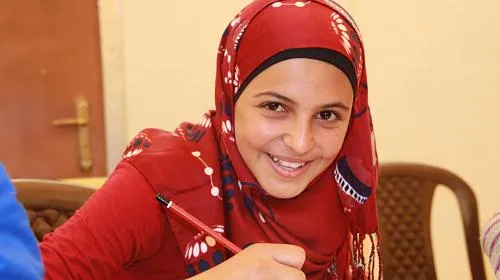Ahead of the International Day of the Girl on 11 October, CARE International warns that an increasing number of Syrian refugee parents are arranging marriages for their daughters due to economic hardship and concerns about the security and protection of their daughters in an unknown environment.
“Parents are telling us that they do not see any other solution but arranging for their daughter to marry earlier than they traditionally would have in Syria. For most girls this means that they don’t continue to go to school,” says Salam Kanaan, Country Director for CARE Jordan. Before the conflict in Syria started an average of 13 percent of marriages involved girls under the age of 18 years. According to UNICEF the rate of child marriages among Syrian refugees in Jordan today has increased to 32 percent in the first quarter of 2014.
The factors responsible for increasing child marriage are rooted in the economic hardships and insecurities Syrian refugee families face. Refugees are struggling more than ever to cope with debts and rising living costs. Parents cannot afford to feed all of their children and are encountering difficulties to make ends meet in Jordan and other neighboring countries that have so generously received more than 3 million Syrians since the conflict began. “Families are becoming more and more destitute. After having lived outside their home country for more than three and a half years, they do not have any savings left and are financially extremely vulnerable.” Families are also extremely concerned about their ability to provide protection for their daughters and this has become another reason for girls to marry earlier than before the conflict started. “Some of my friends married because they and their parents were afraid that they might face sexual harassment or be abducted. They feel they might be safer when they are married,” explains Muzoon, a 16 year old Syrian refugee girl in Azraq Camp who advocates against child marriage. “They are risking their lives and are afraid of complications during pregnancy. My friends who are married have all stopped going to school.”
In addition to lifesaving assistance, CARE is providing psychosocial support to Syrian refugees in Jordan, Lebanon, Egypt and vulnerable families in Syria. In Jordan, CARE has provided financial and social support to Syrian refugees so that families are more financially stable stable and able to send their children to school. CARE has also created safe spaces, both in Azraq camp and in the urban community centers in East Amman, Zarka, Irbid, Mafraq and Azraq town, where refugee children can play safely, read books, and be in an environment where they can feel like children again. CARE also holds activities for women and girls in the safe spaces so that female refugees can have their own time of privacy. Furthermore, CARE is providing conditional cash assistance for families to help their girls go back to school, rather than out in the labor market. In Egypt, CARE works with refugee girls and women to raise awareness of and ways to protect against gender-based violence – including early marriage.
“Girls are amongst the most vulnerable within the Syrian refugee community. We need to make sure that girls can continue their education and find a sense of normalcy after nearly four years of conflict, displacement and painful memories. It is not only about the immediate term; empowerment is a critical investment in every refugee girl’s future, and, ultimately, in the future of Syria,” says Kanaan.

